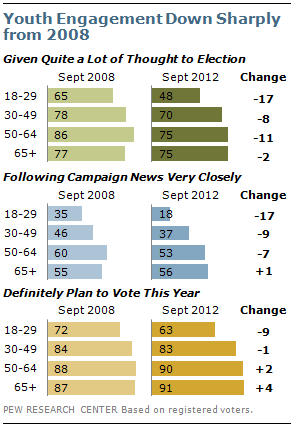 Young voters are significantly less engaged in this year’s election than at a comparable point in 2008 and now lag far behind older voters in interest in the campaign and intention to vote. The share of voters younger than 30 who are following campaign news very closely is roughly half what it was at this point four years ago (18%, down from 35%). Just 63% of young registered voters say they definitely plan to vote this year, down from 72% four years ago.
Young voters are significantly less engaged in this year’s election than at a comparable point in 2008 and now lag far behind older voters in interest in the campaign and intention to vote. The share of voters younger than 30 who are following campaign news very closely is roughly half what it was at this point four years ago (18%, down from 35%). Just 63% of young registered voters say they definitely plan to vote this year, down from 72% four years ago.
Not only are young registered voters less engaged, but fewer young people are registered to vote. In all Pew Research Center polling conducted over the course of 2012, only half (50%) of adults under 30 say they are absolutely certain that they are registered. This 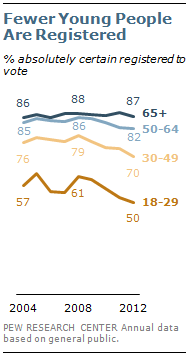 compares with 61% in 2008 and 57% in 2004. Registration rates typically rise over the course of election years, but for youth voter registration to reach 2008 levels the figures will have to shift decidedly over the coming month.
compares with 61% in 2008 and 57% in 2004. Registration rates typically rise over the course of election years, but for youth voter registration to reach 2008 levels the figures will have to shift decidedly over the coming month.
Both of these trends are disadvantages for Barack Obama, who continues to hold a wide lead among young voters. In the latest Pew Research Center survey, conducted Sept. 12-16, registered voters under 30 favored Obama over Romney by 59% to 33%, and that margin has held relatively steady over the course of the year.
But so far, any potential damage to Obama has been mitigated by three factors. First, the decline in youth engagement is not limited to Obama supporters. In fact, the dropoff is at least as steep among young voters who intend to vote Republican. Second, other segments of Obama’s electoral base – notably African Americans – remain highly engaged in the election. Third, declining engagement in a key Republican subgroup – moderate Republicans – at least partially offsets falling interest among the young.
Youth Engagement Slips
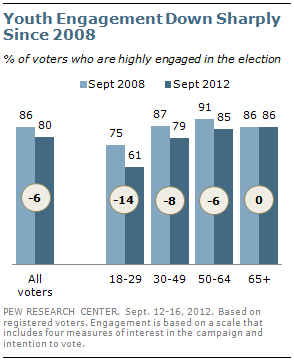 While most measures of voter engagement remain fairly high in 2012, overall interest and commitment to voting is down slightly when compared with the highly-charged 2008 election campaign. The share of registered voters who score high (three out of four) on a scale of four questions about interest in the campaign and intention to vote has slipped from 86% to 80% overall.
While most measures of voter engagement remain fairly high in 2012, overall interest and commitment to voting is down slightly when compared with the highly-charged 2008 election campaign. The share of registered voters who score high (three out of four) on a scale of four questions about interest in the campaign and intention to vote has slipped from 86% to 80% overall.
This slippage is particularly steep among voters under 30; just 61% are highly engaged in the 2012 campaign, down from 75% at this point four years ago. By contrast, fully 86% of voters 65 and older are highly engaged, which is unchanged from four years ago. Interest also is down among voters 30-to-49 (eight points) and those 50-to-64 (six points), although both groups remain more engaged in the election than those under 30.
The drop in youth engagement does not have a political tilt to it; the slippage is equally evident among both Obama and Romney supporters. Among voters under 40 who support Obama, 58% have given a lot of thought to the election this year, down from 70% among young Obama supporters four years ago.
But the trend among young Republican voters is almost identical. Just 59% of young voters who support Romney have given a lot of thought to the election, down from 75% among 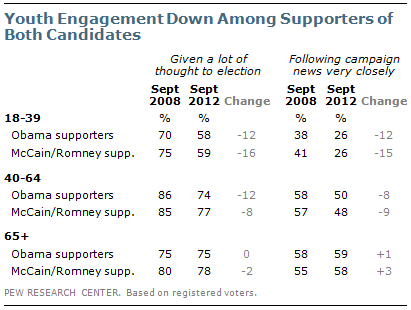 young McCain supporters in 2008. (For this analysis, all voters under age 40 are analyzed because there are too few 18-to-29- year-old Romney supporters to evaluate separately.)
young McCain supporters in 2008. (For this analysis, all voters under age 40 are analyzed because there are too few 18-to-29- year-old Romney supporters to evaluate separately.)
The decline in engagement among voters age 40-to-64 also has come among voters in both parties. Among Obama supporters in this age group, there has been a 12-point decline in the percentage giving a lot of thought to the election; among Romney supporters 40-to-64, there has been an eight-point decline since 2008. Engagement among voters 65 and older is similar to 2008; older Obama and Romney supporters are as engaged as Obama and McCain supporters were in 2008.
The pattern is nearly identical in levels of campaign news interest. Fewer voters younger than 40 and 40-to-64 say they are very closely following campaign news than in 2008 and the declines are comparable among Obama supporters and Romney supporters. Voters 65 and older are as interested in campaign news as they were four years ago; there are no differences between Obama and Romney voters.
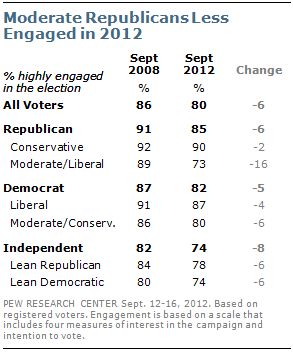 This pattern is consistent with the lack of an engagement gap between Republicans and Democrats overall. Since the summer, Democratic interest in the campaign has surged, closing an engagement deficit that was apparent earlier in the year.
This pattern is consistent with the lack of an engagement gap between Republicans and Democrats overall. Since the summer, Democratic interest in the campaign has surged, closing an engagement deficit that was apparent earlier in the year.
While younger voters make up a larger share of the Democratic base – and their enthusiasm decline could affect Democratic turnout levels in November – there is a comparable decline in GOP engagement as well, particularly in the moderate wing of the party. Just 73% of moderate and liberal Republicans, a group that accounts for 27% of Republican voters overall, are highly engaged in the current survey, down from 89% four years ago.
 Drop in Voter Registration, Especially Among Young
Drop in Voter Registration, Especially Among Young
Voter registration rates have declined since 2008, especially among young people. In interviews conducted over the course of 2012 so far, 72% of adults 18 and older say they are absolutely certain they are registered to vote. This is lower than in 2008, when 79% were registered to vote and in 2004 (76% registered to vote).
In polls conducted from January to September, just half of those under 30 are certain they are registered to vote – 11 points lower than in 2008 – and the lowest number in the past 16 years of Pew Research Center polling. There also has been a nine-point decline in voter registration among those 30-to-49. Voter registration has slipped four points among those 50-to-64 but is virtually unchanged among those 65 and older.
More people still may register to vote in the five weeks remaining before the election. Voter registration typically increases in the second half of election years, especially among young 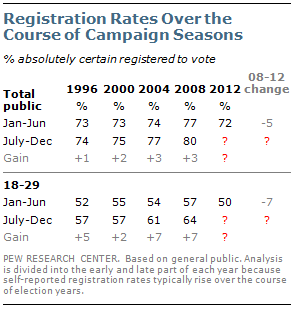 people. In 2008, the share of young adults who said they were certain they were registered jumped six percentage points from the first half to the second half of the year.
people. In 2008, the share of young adults who said they were certain they were registered jumped six percentage points from the first half to the second half of the year.
Yet even when these seasonal factors are taken into account, young adults are starting this year with the lowest registration rate of the last five presidential elections. In polling conducted over the first six months of 2012, half (50%) of adults younger than 30 say they are certain that they are registered. This compares to a 57% registration rate in the first half of 2008, which rose to 64% over the latter part of that year.
Age Gap in Voting Preferences
Throughout this election cycle, Obama has consistently held a substantial lead over Romney among young voters. In polls conducted since April, he holds a 59% to 35% advantage among registered voters under 30. That is somewhat narrower than the 66% to 32% margin he had over McCain in 2008.
Obama has lost support from 2008 among young men and young white voters. Obama holds a 53% to 40% advantage over Romney 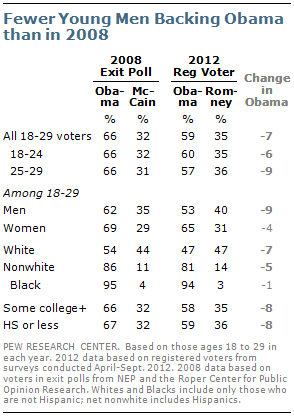 among men under 30 but that is narrower than the 27-point margin he had over McCain in 2008. There has been little change among young women voters; 65% back Obama while just 31% support Romney. There is now a 12-point gap in Obama’s support between young men and young women.
among men under 30 but that is narrower than the 27-point margin he had over McCain in 2008. There has been little change among young women voters; 65% back Obama while just 31% support Romney. There is now a 12-point gap in Obama’s support between young men and young women.
Obama has lost substantial ground among young white voters. He had a 10-point advantage among this group in 2008, but they are now divided (47% support Obama, 47% support Romney). Young non-whites still back Obama by a wide margin (81% to 14%).
Obama’s support is equally strong among younger and older members of the 18-29 age group. He leads Romney by 60% to 35% among voters ages 18-24 and by 57%-36% among those in the 25-29 age group. Among voters 18-21, who were not eligible to vote in 2008, Obama holds a 61% to 36% margin. Similarly, Obama receives about the same level of support from young voters who have attended college and those that have not.


